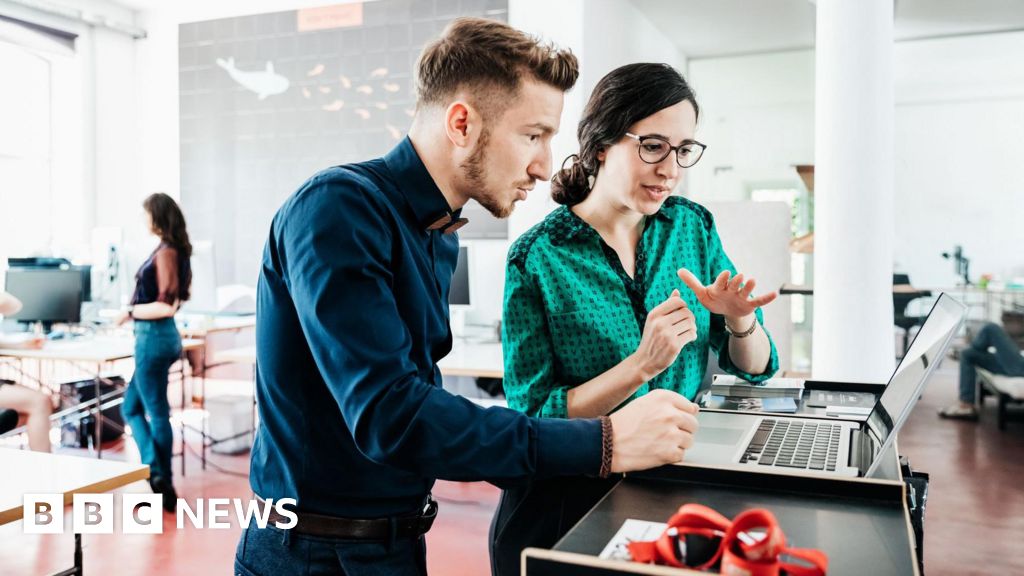Two wheelchair users are wearing the No Limbits “Wheelchair collection”.
Logan Manaker LLC
The U.S. Department of Labor charts the unemployment rate for people with disabilities at 7.9%, compared to 3.8% for people without disabilities. Many factors account for this discrepancy, including inaccessible workplaces, ill-equipped office spaces and a deep-rooted bias against people with disabilities. This leads many in the disability community to seek alternate career paths, like entrepreneurship. In other words, launching your own startup business, which begs the question: Are the right tools and policies in place to support founders with disabilities?
The Right Set-Up
From the outside, startup life looks and sounds like a glamorous gig. Being your own boss, flexible working hours, the ability to work remotely. These conditions are even more appealing to someone who lives with a disability or chronic illness and who needs that flexibility to cater to their condition through at-home care or regular medical visits. Individuals with reduced mobility who are in a wheelchair, use a cane or have a prosthetic leg may also welcome the opportunity to work from home in order to reduce the stress and strain of daily commute. Since the pandemic, remote work and work-from-home setups have become more widely accepted, giving founders more opportunities to connect with potential investors virtually.
“Before COVID, you wouldn’t have been able to raise a round via Zoom,” says Erica Cole, the founder and CEO of No Limbits. “It was very difficult for me to travel and conferences weren’t accessible, which was a challenge.” Cole became a below knee amputee on the left side a few years ago after losing her leg in an accident. When she started using an osseointegrated prosthesis, she quickly realised how challenging it was to put on clothes. So she started making her own and turned it into a business that sells adaptive clothes for wheelchair users, individuals with limited dexterity and individuals with lower limb differences, among other things. “Entrepreneurship was a path that was available to me that I hadn’t considered before,” she adds.
Erica Cole, the founder and CEO of No Limbits.
Logan Manaker LLC
While Cole was able to successfully raise capital from angels, impact funds and SharkTank, there are many hurdles specifically tied to being a disabled founder that she’s had to overcome — one of them being the widespread ignorance around market size. “People don’t realise how large the disabled community is and how much disposable income there is there,” Cole tells me. “The disability market is under-estimated and undervalued as there is not a lot of data available. Every investor conversation I go to I have to educate them on the market and opportunity.”
A Competitive Edge
Cole is one of the many founders to have participated in 2Gether-International’s accelerator program, which supports entrepreneurs with disabilities. Through its initiative, 2GI strives to flip the narrative around disabilities by showcasing disability as a competitive advantage for businesses.
“Imagine a world where disability isn’t perceived through a restrictive lens of limitation, but instead celebrated as a unique perspective that fuels innovation,” says Diego Mariscal, the founder, CEO and Chief Disabled Officer of 2GI. “This isn’t mere speculation, it’s a proven reality. Curb-cuts, sliding doors and text messaging — these innovations were originally developed for the disability community but have since become indispensable to everyone. How many more innovations are we overlooking by not funding and fully supporting Disabled entrepreneurs?”
1.3 Billion People With Disabilities
The World Health Organization (WHO) estimates that there are 1.3 billion people – or 16% of the global population – who experience a significant disability today. So the market definitely isn’t niche. And even if the targeted users or consumers don’t have a disability themselves, it is very likely that they will have a partner, relative, friend or colleague who lives with a disability.
Matt Pierri, who is the founder and CEO of Sociability, is also striving to convince investors of the massive market opportunity. “When you’re pitching a disability venture, there is often a presumption that you’re a non-profit or a charity,” he tells me. “There’s a stereotype that disabled people aren’t customers or consumers; that they don’t have money to spend or don’t want to do the same activities as non-disabled people, like travelling or going out to bars and restaurants.”
Matt Pierri, the founder and CEO of Sociability.
Sociability
The Sociability app helps disabled people find accessible places like restaurants, pubs and bars. Pierri says that there are almost 8,000 users signed up to date and data for more than 10,000 venues on the platform. While the startup only actively operates in the UK at present (i.e. the team only maps, vets and adds venue data in London), the platform does work globally if users want to add venues themselves. The team is currently planning their next international city rollout. Pierri, who is a wheelchair user, initially got the idea to map out accessible places when he started studying at Oxford University a few years ago. When he asked admissions which colleges were wheelchair accessible, he was stunned to learn that there was little to no information on campus accessibility.
Another challenge Pierri faces is investors’ narrowly-defined version of what a successful founder looks like. “There’s a lot less willingness to believe in or bet on disabled founders,” he says. “We don’t fit the stereotypical mould of most investors: the young, white, abled-bodied guy from Stanford with an idea and a PowerPoint slide.”
And that’s the Catch-22: Investors are sceptical about how big of a market the disability space is as there are very few data points available, yet they’re often reluctant to back founders who are on a mission to prove out just how big it actually is. This not only results in very little funding going to disabled founders, but also significantly decreases their chances of getting funding at all. A recent report published by Acces2Funding stated that disabled founders are 400 times less likely to receive VC funding.
Income Or Insurance?
While founders with disabilities have to quadruple their efforts to try and get funding for their startups, they also have to simultaneously worry about health insurance. “Abled-bodied entrepreneurs sometimes choose not to pay for insurance,” says No Limbits’ Erica Cole. “Disabled founders can’t afford to take that risk. My prosthetic is so expensive, I wouldn’t be able to walk without insurance.”
Margaret Andersen, who is the co-founder of inclusive sexual wellness startup TouchBot, faces similar challenges. Due to her Muscular Dystrophy, the young entrepreneur is a power wheelchair user and relies on personal care workers to help with her daily routine like transferring her from the bed or the bathroom, getting ready in the morning, preparing meals or accompanying her to appointments. Andersen tells me that Medicaid is the main source of health insurance for many disabled people as Medicare and private insurance don’t cover services like personal care.
Margaret Andersen, co-founder of TouchBot.
TouchBot
“The problem that many disabled people encounter, myself included, is because Medicaid is an income-based program, you can lose coverage if you earn too much, forcing many disabled people to choose between employment and their benefits,” Andersen says. “So even though running my own business has allowed me to work from home with flexible hours, it’s been a complicated path to navigate because I’ve always had to worry about going over Medicaid’s income limits.”
So while founder life is stressful for any individual who ventures onto that path, it is even more stressful when that path is paved with discriminatory hurdles.
Credit: Source link


-2.jpg#keepProtocol)








